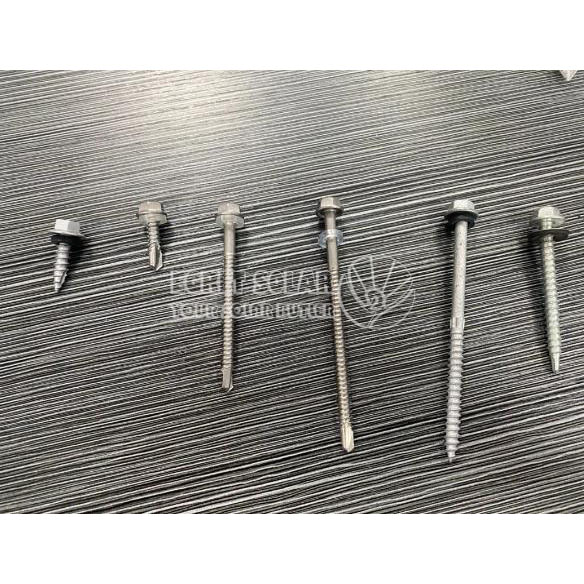- English
- Español
- Português
- русский
- Français
- 日本語
- Deutsch
- tiếng Việt
- Italiano
- Nederlands
- ภาษาไทย
- Polski
- 한국어
- Svenska
- magyar
- Malay
- বাংলা ভাষার
- Dansk
- Suomi
- हिन्दी
- Pilipino
- Türkçe
- Gaeilge
- العربية
- Indonesia
- Norsk
- تمل
- český
- ελληνικά
- український
- Javanese
- فارسی
- தமிழ்
- తెలుగు
- नेपाली
- Burmese
- български
- ລາວ
- Latine
- Қазақша
- Euskal
- Azərbaycan
- Slovenský jazyk
- Македонски
- Lietuvos
- Eesti Keel
- Română
- Slovenski
- मराठी
- Srpski језик
Solar Self Tapping Screw and Self Drilling Screw
Name: Solar Self tapping Screw and Self drilling screw
Brand: Egret Solar
Product Origin: Fujian, China
Material: Aluminium
Warranty: 12years
Duration: 25years
Shipping Port: Xiamen Port
Lead Time: 7-15 days
Max Wind Speed: 60m/s
Max Snow Load: 1.4kn/㎡
Send Inquiry
Solar Self tapping Screw and Self drilling screws are frequently used in roof solar mounting structure. Both of them are easily confused by people. Today we'd like to introduce these two screws to you for your better understanding about what you should choose for your roof pv mounting systems.

The big difference that we can directly see is the ti on each screw is different. This is a great way to identify them from each other



Solar Self tapping Screw and Self drilling screws are both types of screws that are designed to create their own threads as they are driven into materials. However, there are some key differences between the two.
Solar Self Tapping Screw and Self Drilling Screw are designed to create threads in materials that do not already have threads. They have a sharp, pointed tip that is used to pierce the material and create a pilot hole, which is then followed by the screw threads. Self-tapping screws are typically used in softer materials such as wood, plastic, and thin sheets of metal.
Solar Self Tapping Screw and Self Drilling Screw, on the other hand, are designed to drill their own pilot hole as they are driven into the material. This eliminates the need for a separate drilling operation, which can save time and effort. Self-drilling screws have a tapered point and flute that allows them to drill and tap threads in harder materials such as steel and other metals.
In summary, Solar Self Tapping Screw and Self Drilling Screw are used to create threads in materials without existing threads, while self-drilling screws are drilling and tapping their own threads as they are driven into the material. The type of screw to use usually depends on the material being fastened and the specific application.

Self-Drilling Screws VS Self-Tapping Screws
Here is where the real confusion comes in, all self-drilling screws are self-tapping screws, but all self-tapping screws are not self-drilling. Basically a self-drilling screw is similar to a sheet metal screw, but doesn’t need a separate pilot hole, as it can drill its own. Both of these fasteners tap their own threads, but to varying degrees. Self-drilling screw’s structure make them ideal for joining thin metal sheets onto wood or metal frames. On the other hand, self-tapping screws are suitable for hard metals that need a pilot hole.
A self-tapping screw is often known as simply Tapping screws. These are also called Sheet Metal Screws as they are commonly used in metals. Whatever name is used, these names are for those screws that primarily form mating threads, which is also known as ‘tapping’ , into a pre-drilled hole, into whichever material it is driven into.
A self-drilling screw is essentially a self-tapping screw which has an added feature of having a drill point. Self-drilling screws drill a pilot hole and form mating threads, all in one operation.
The real confusion is, while describing a screw, people often interchange the term Self-drilling and Self-tapping screws. If a screw can drill its own pilot hole, then it is Self-drilling and if a screw needs pre-drilled holes to get in, then it is a Self-tapping screw. While we have already discussed that Self-drilling and Self-tapping cannot be used interchangeably, these fasteners come in various configurations and sizes, and are extensively used in the commercial and construction industries.
Advantages:
1、Drilling, thread-forming and fastening in one step
2、Connect components in one step
3、Reduces assembly times
4、Save tool changes and drilling tool costs

FAQ
1. What is a self-tapping screw?
Answer: A self-tapping screw is a screw that is designed to create its own threads in a material as it is being driven in, without the need for a pre-drilled pilot hole. These are typically used in softer materials such as wood or plastic.
2. What is a self-drilling screw?
Answer: A self-drilling screw is a screw that has a drill bit-like tip which allows it to drill its own pilot hole as it is being driven in. This is useful when drilling a pilot hole is either not practical or not necessary. These are typically used in harder materials such as steel or other metals.
3. What are the differences between self-tapping and self-drilling screws?
Answer: Self-tapping screws are designed to create threads in a material that does not already have threads, while self-drilling screws are designed to drill their own pilot hole and create threads in the material as they are being driven in. Self-drilling screws are typically used in harder materials, while self-tapping screws are typically used in softer materials.
4. When should I use self-tapping screws?
Answer: Self-tapping screws are best used in softer materials such as wood, plastic, or thin sheets of metal, where their ability to create their own threads can be useful.
5. When should I use self-drilling screws?
Answer: Self-drilling screws are best used in harder materials such as steel or other metals, where pre-drilling a pilot hole would be difficult or not practical.











